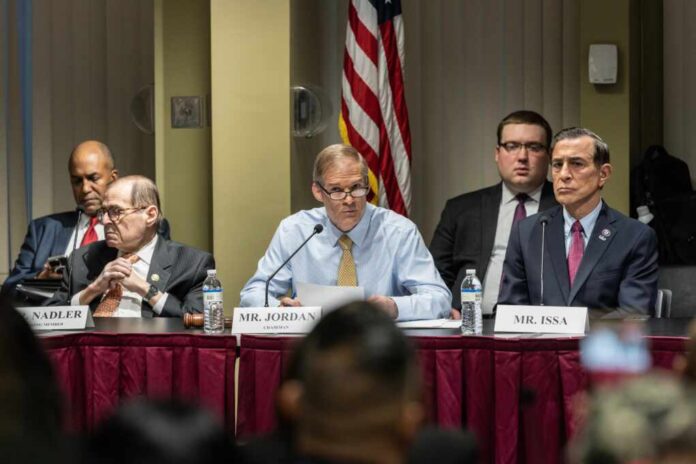
House Judiciary Committee Republicans are determined to push forward with comprehensive reforms aimed at government FISA surveillance powers. These reforms include a provision that would prevent the FBI from accessing Americans’ phone records without a court-approved warrant, among other changes.
The initiative is progressing well and is expected to conclude by the end of the year, coinciding with the expiration of several Patriot Act provisions. Lawmakers from both the Republican and Democratic parties are joining forces in a rare display of bipartisan cooperation.
#FISA cannot be reauthorized until necessary reforms are made to ensure that it does not continue to be abused & weaponized against Americans. This is one of the things #GOP must tackle now that a new Speaker has been elected. @theblaze https://t.co/iut9P9jfRq
— Project for Privacy & Surveillance Accountability (@savingprivacy) November 3, 2023
Rep. Jim Jordan (R-OH) said, “We’ve got, I think, strong agreement amongst members of the Intel Committee and members of the Judiciary Committee. And frankly, some Democrats as well, that there needs to be stronger penalties if you abuse the system.”
Jordan emphasized his concentration on the Section 702 system, which allows for the creation of a database containing phone communication metadata. This database is presently accessible to agents without the need for a warrant.
Earlier this year, the Foreign Intelligence Surveillance Court declassified a report that disclosed the improper search of Americans’ phone records by FBI agents, totaling more than 270,000 searches over a two-year period. This revelation raised concerns among civil liberty experts and prompted bipartisan condemnation.
Jordan said, “There needs to be more transparency, more accountability, more audits and reporting to Congress and to the American people, so I think we have broad agreement there that those kinds of fundamental changes have to happen.”
He continued, “But then the real question, maybe the more fundamental question, is, do we require a warrant before you can actually query any information regarding American citizens? I think you should. That’s where the Judiciary Committee members are, and we’re going to try to work through that issue.”
Jordan asserted that a significant overhaul of Section 702 surveillance is poised to become the central component of a broader reform of the government’s Foreign Intelligence Surveillance Act powers, which were expanded in the aftermath of the September 11, 2001, terrorist attacks in the fight against Al-Qaeda.
He stated, “There’s gonna be major reform to not just 702, but I think the entire FISA. Our goal here is in the next two months.”
Rep. Andy Biggs (R-AZ), who has been facilitating informal discussions for months with members from both the Democratic and Republican parties in an effort to build a bipartisan agreement, commended Jordan and his fellow lawmakers for their cooperative approach.
Biggs said, “We’ve been working in a task force with the Intel Committee guys. I think we’ve reached a lot of harmony on a lot of ideas. The last issue probably is just how we solve some of these issues where the FBI, NSA, and CIA want to go in and look at phone records and other private data points. And that’s where we’re going to solve those. I think we’re going to smooth it out and hopefully be able to get something done before the end of the year. I believe we will.”













